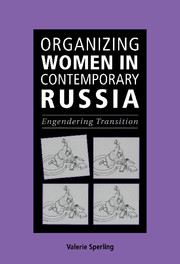Book contents
- Frontmatter
- Contents
- List of tables
- Acknowledgments
- Note on transliteration
- Map
- Introduction
- 1 Russian women's movement groups and activists
- 2 Analyzing social movements
- 3 Feminism, femininity, and sexism: socio-cultural opportunities and obstacles to women's movement organizing
- 4 “Democracy without women is not democracy!”: political opportunities and obstacles to women's movement organizing
- 5 “Unemployment has a woman's face…”: economic opportunities and obstacles to women's movement organizing
- 6 Remembrance of things past: the impact of political history on women's movement organizing
- 7 International influences on the Russian women's movement
- Conclusion
- Appendix
- Selected bibliography
- Index
3 - Feminism, femininity, and sexism: socio-cultural opportunities and obstacles to women's movement organizing
Published online by Cambridge University Press: 22 September 2009
- Frontmatter
- Contents
- List of tables
- Acknowledgments
- Note on transliteration
- Map
- Introduction
- 1 Russian women's movement groups and activists
- 2 Analyzing social movements
- 3 Feminism, femininity, and sexism: socio-cultural opportunities and obstacles to women's movement organizing
- 4 “Democracy without women is not democracy!”: political opportunities and obstacles to women's movement organizing
- 5 “Unemployment has a woman's face…”: economic opportunities and obstacles to women's movement organizing
- 6 Remembrance of things past: the impact of political history on women's movement organizing
- 7 International influences on the Russian women's movement
- Conclusion
- Appendix
- Selected bibliography
- Index
Summary
Q. Why did you decide to form a women's group?
A. Because I'm a woman. (Laughs.)
Interview with Nina Iakovchuk, May 5, 1995.In order to emerge publicly, social movements need to gather a core group of people who perceive the existence of a shared, societal injustice, and who believe that a challenge to the existing order might hold some hope for improving the situation. Social movement activists, by definition, have begun such a transformation of consciousness. They regard the injustice or set of injustices experienced by a given societal group or class (of which they are often, but not always, a part) as a systemic problem. Furthermore, activists believe that overcoming the injustice is feasible; otherwise they would be unlikely to enter into social activism, which is usually low-paid or volunteer work, with few immediate rewards. The women's movement activists in Russia who began women's organizations of various types between 1987 and 1994 possessed a well-developed sense of women's oppression, a consciousness transformed from seeing women's problems as being individual or personal to seeing them as political or social – as shared injustices.
This chapter explores the process of transformation of consciousness and the obstacles that confront it in the Russian case. I consider the transformation of consciousness among women's movement activists, and also the potential for that transformation to spread more widely in Russian society. Without this transformation the movement cannot hope to achieve a mass status that might hasten cultural change.
- Type
- Chapter
- Information
- Organizing Women in Contemporary RussiaEngendering Transition, pp. 54 - 97Publisher: Cambridge University PressPrint publication year: 1999



